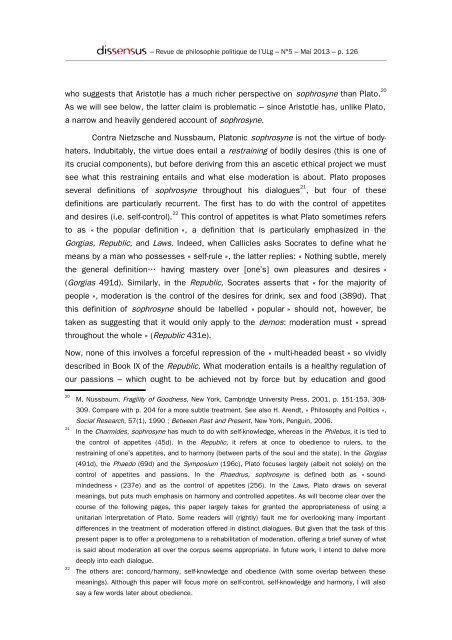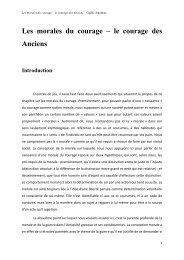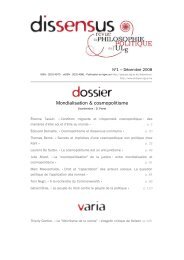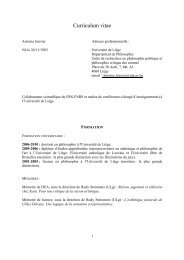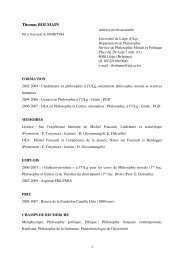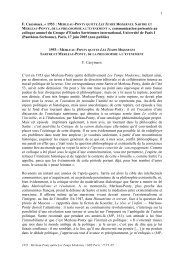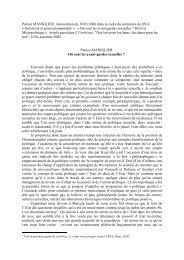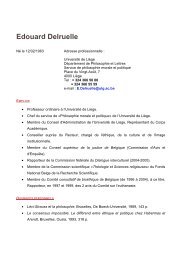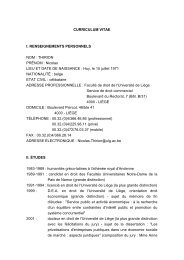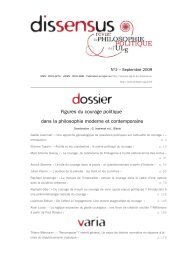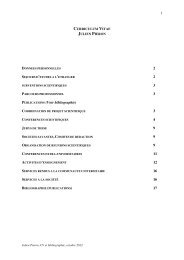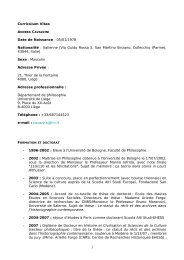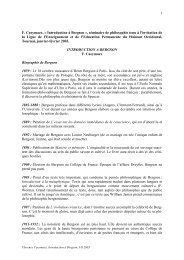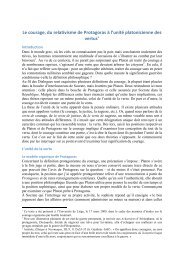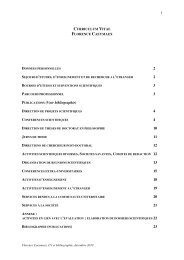Subjectivations politiques et économie des savoirs - Service de ...
Subjectivations politiques et économie des savoirs - Service de ...
Subjectivations politiques et économie des savoirs - Service de ...
Create successful ePaper yourself
Turn your PDF publications into a flip-book with our unique Google optimized e-Paper software.
– Revue <strong>de</strong> philosophie politique <strong>de</strong> l’ULg – N°5 – Mai 2013 – p. 126<br />
who suggests that Aristotle has a much richer perspective on sophrosyne than Plato. 20<br />
As we will see below, the latter claim is problematic – since Aristotle has, unlike Plato,<br />
a narrow and heavily gen<strong>de</strong>red account of sophrosyne.<br />
Contra Ni<strong>et</strong>zsche and Nussbaum, Platonic sophrosyne is not the virtue of bodyhaters.<br />
Indubitably, the virtue does entail a restraining of bodily <strong><strong>de</strong>s</strong>ires (this is one of<br />
its crucial components), but before <strong>de</strong>riving from this an asc<strong>et</strong>ic <strong>et</strong>hical project we must<br />
see what this restraining entails and what else mo<strong>de</strong>ration is about. Plato proposes<br />
several <strong>de</strong>finitions of sophrosyne throughout his dialogues 21 , but four of these<br />
<strong>de</strong>finitions are particularly recurrent. The first has to do with the control of app<strong>et</strong>ites<br />
and <strong><strong>de</strong>s</strong>ires (i.e. self-control). 22 This control of app<strong>et</strong>ites is what Plato som<strong>et</strong>imes refers<br />
to as « the popular <strong>de</strong>finition », a <strong>de</strong>finition that is particularly emphasized in the<br />
Gorgias, Republic, and Laws. In<strong>de</strong>ed, when Callicles asks Socrates to <strong>de</strong>fine what he<br />
means by a man who possesses « self-rule », the latter replies: « Nothing subtle, merely<br />
the general <strong>de</strong>finition… having mastery over [one’s] own pleasures and <strong><strong>de</strong>s</strong>ires »<br />
(Gorgias 491d). Similarly, in the Republic, Socrates asserts that « for the majority of<br />
people », mo<strong>de</strong>ration is the control of the <strong><strong>de</strong>s</strong>ires for drink, sex and food (389d). That<br />
this <strong>de</strong>finition of sophrosyne should be labelled « popular » should not, however, be<br />
taken as suggesting that it would only apply to the <strong>de</strong>mos: mo<strong>de</strong>ration must « spread<br />
throughout the whole » (Republic 431e).<br />
Now, none of this involves a forceful repression of the « multi-hea<strong>de</strong>d beast » so vividly<br />
<strong><strong>de</strong>s</strong>cribed in Book IX of the Republic. What mo<strong>de</strong>ration entails is a healthy regulation of<br />
our passions – which ought to be achieved not by force but by education and good<br />
20<br />
21<br />
22<br />
M. Nussbaum, Fragility of Goodness, New York, Cambridge University Press, 2001, p. 151-153, 308-<br />
309. Compare with p. 204 for a more subtle treatment. See also H. Arendt, « Philosophy and Politics »,<br />
Social Research, 57(1), 1990 ; B<strong>et</strong>ween Past and Present, New York, Penguin, 2006.<br />
In the Charmi<strong><strong>de</strong>s</strong>, sophrosyne has much to do with self-knowledge, whereas in the Philebus, it is tied to<br />
the control of app<strong>et</strong>ites (45d). In the Republic, it refers at once to obedience to rulers, to the<br />
restraining of one’s app<strong>et</strong>ites, and to harmony (b<strong>et</strong>ween parts of the soul and the state). In the Gorgias<br />
(491d), the Phaedo (69d) and the Symposium (196c), Plato focuses largely (albeit not solely) on the<br />
control of app<strong>et</strong>ites and passions. In the Phaedrus, sophrosyne is <strong>de</strong>fined both as « soundmin<strong>de</strong>dness<br />
» (237e) and as the control of app<strong>et</strong>ites (256). In the Laws, Plato draws on several<br />
meanings, but puts much emphasis on harmony and controlled app<strong>et</strong>ites. As will become clear over the<br />
course of the following pages, this paper largely takes for granted the appropriateness of using a<br />
unitarian interpr<strong>et</strong>ation of Plato. Some rea<strong>de</strong>rs will (rightly) fault me for overlooking many important<br />
differences in the treatment of mo<strong>de</strong>ration offered in distinct dialogues. But given that the task of this<br />
present paper is to offer a prolegomena to a rehabilitation of mo<strong>de</strong>ration, offering a brief survey of what<br />
is said about mo<strong>de</strong>ration all over the corpus seems appropriate. In future work, I intend to <strong>de</strong>lve more<br />
<strong>de</strong>eply into each dialogue.<br />
The others are: concord/harmony, self-knowledge and obedience (with some overlap b<strong>et</strong>ween these<br />
meanings). Although this paper will focus more on self-control, self-knowledge and harmony, I will also<br />
say a few words later about obedience.


